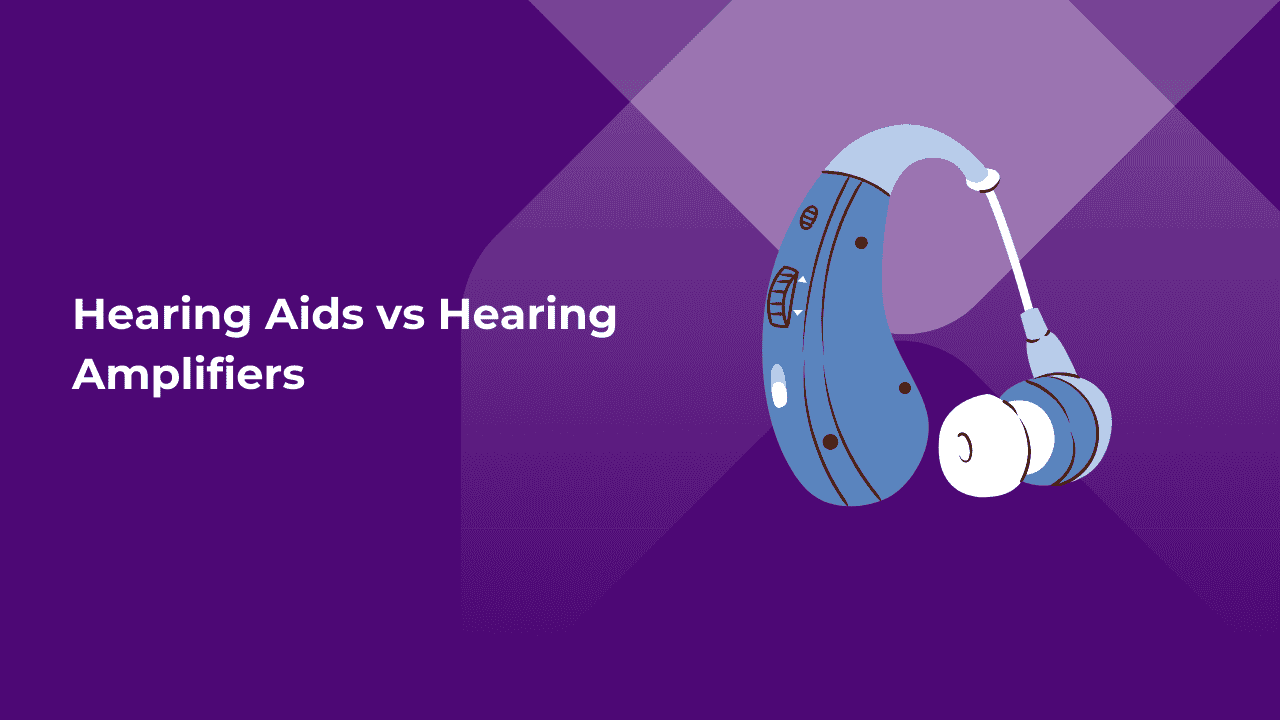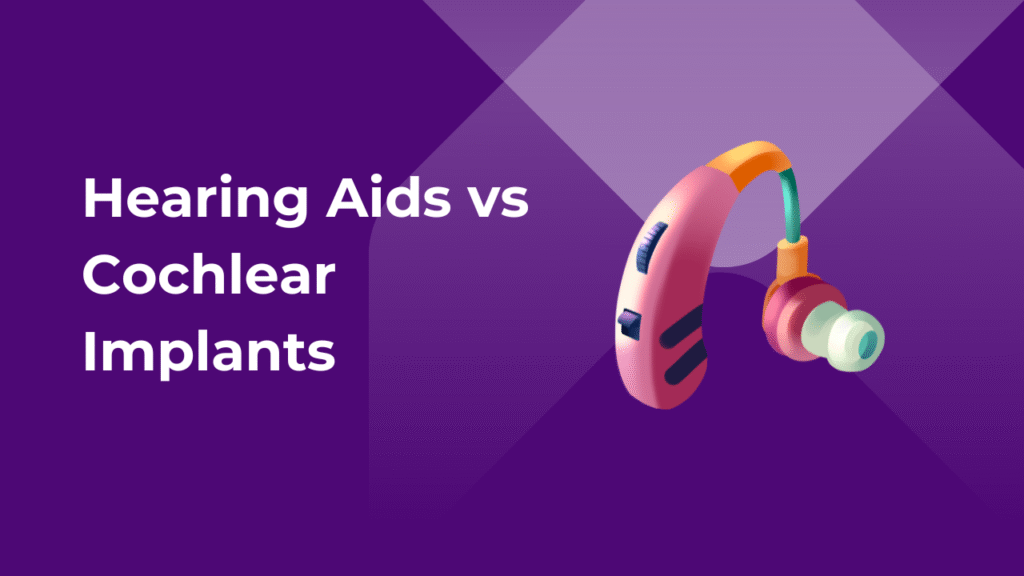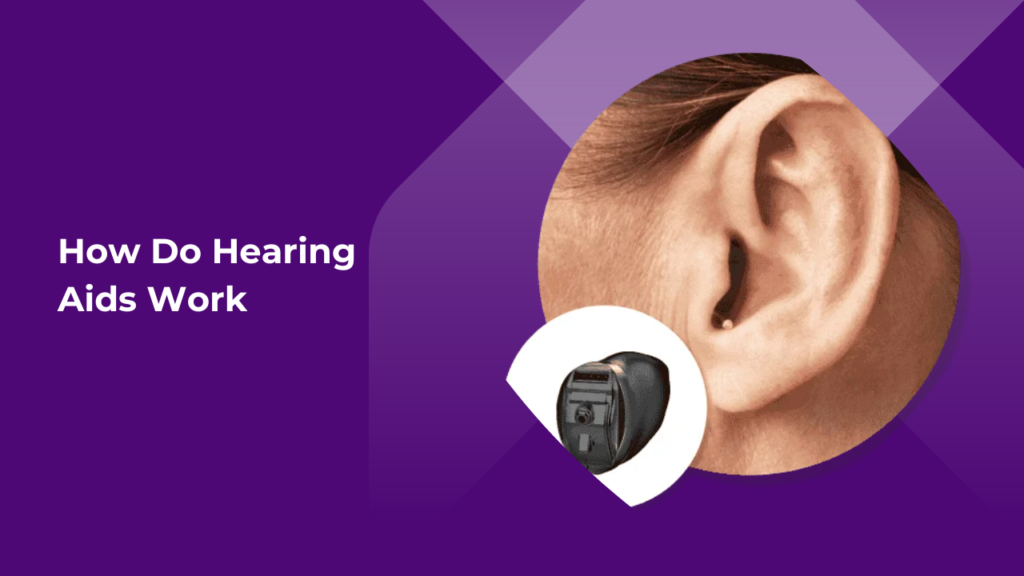When it comes to improving your hearing, the options available can be a bit overwhelming. Two of the most common devices are hearing aids and hearing amplifiers. While they might seem similar at first glance, they serve very different purposes. Understanding these differences is crucial in making an informed decision that aligns with your hearing needs.
A Quick Introduction to Hearing Aids: How They Work and Who They Help
Hearing aids are sophisticated devices designed to address varying degrees of hearing loss. They are small, wearable electronic devices that amplify sound, making it easier for those with hearing impairments to perceive and understand speech and environmental sounds. Hearing aids don’t just make everything louder; they are calibrated to enhance specific frequencies based on the wearer’s unique hearing profile. This personalization is achieved through a detailed fitting process conducted by an audiologist, ensuring that the device targets the areas of hearing where it’s needed most. As a result, hearing aids are particularly beneficial for individuals with moderate to severe hearing loss, helping them reengage with the sounds of life that they might have been missing.
What Are Hearing Amplifiers? Exploring Their Purpose and Functionality
Hearing amplifiers, on the other hand, are less complex devices intended primarily to boost all sound. Unlike hearing aids, they do not differentiate between different types of sounds or frequencies. Their primary function is to make everything louder—whether it’s the conversation happening next to you or the background noise in a busy café. Because of this broad amplification, hearing amplifiers are often marketed to individuals with normal hearing who want to enhance their ability to hear in certain situations, such as bird watching or hunting. However, this one-size-fits-all approach can be problematic for someone with hearing loss, as it lacks the tailored support that hearing aids provide.
The Key Differences Between Hearing Aids and Hearing Amplifiers: Beyond Amplification
While both devices amplify sound, the key differences lie in their technology and purpose. Hearing aids are medical devices that are regulated and customized to meet the specific needs of individuals with hearing loss. They offer features like noise reduction, feedback cancellation, and the ability to distinguish speech from background noise. Hearing amplifiers, however, are not medical devices. They are generally cheaper, not regulated, and lack the advanced technology found in hearing aids. This distinction is critical because using an amplifier as a substitute for a hearing aid can sometimes do more harm than good, potentially leading to further hearing damage due to indiscriminate amplification of all sounds.
Hearing Aids: Advanced Technology for Personalized Hearing
Hearing aids are marvels of modern technology, engineered to do more than just make things louder. They are designed to provide a personalized listening experience that adapts to the unique patterns of hearing loss in each individual.
How Hearing Aids Tailor Sound to Individual Hearing Loss
One of the standout features of hearing aids is their ability to be fine-tuned to the user’s specific hearing loss. During the fitting process, an audiologist conducts a hearing test to determine which frequencies are harder for the user to hear. Based on these results, the hearing aid is programmed to amplify certain sounds more than others. This ensures that the device is not just making everything louder but is instead amplifying the frequencies that the user struggles to hear. The result is a more natural and balanced listening experience that can significantly improve communication and quality of life.
The Role of Audiologists in Fitting and Adjusting Hearing Aids
The expertise of an audiologist is essential when it comes to fitting and adjusting hearing aids. These professionals use their knowledge to ensure that the hearing aids are properly calibrated to the user’s hearing needs. They take into account not just the hearing loss but also factors like lifestyle, comfort, and aesthetics. The fitting process doesn’t end after the initial setup; audiologists provide ongoing support to adjust the settings as needed, ensuring that the hearing aids continue to meet the user’s needs over time. This personalized care is something that hearing amplifiers simply cannot offer.
Features That Set Hearing Aids Apart: Noise Reduction, Feedback Cancellation, and More
Modern hearing aids are packed with features designed to enhance the user experience. Noise reduction technology helps filter out background noise, making it easier to focus on conversations in noisy environments. Feedback cancellation prevents the annoying whistling sound that can occur when sound gets trapped between the microphone and speaker. Some hearing aids also come with directional microphones that focus on sound coming from in front of the user, further improving speech clarity. Additionally, many hearing aids are now compatible with smartphones, allowing users to adjust settings, stream music, and take calls directly through their devices.
Hearing Amplifiers: A Simpler, Less Regulated Option
Hearing amplifiers offer a much simpler solution, but this simplicity comes with significant trade-offs, especially for those with hearing loss.
Understanding the Primary Purpose of Hearing Amplifiers
Hearing amplifiers are designed to do one thing: amplify sound. They are often marketed as personal sound amplification products (PSAPs) and are not intended to correct hearing loss. Instead, they are typically used by individuals with normal hearing who need a little extra boost in specific situations, such as listening to a distant conversation or picking up subtle sounds in nature. Because they amplify all sounds equally, they can make loud noises uncomfortably loud and fail to provide the nuanced hearing support that many people need.
Who Might Benefit from a Hearing Amplifier? Assessing Situational Use Cases
There are scenarios where a hearing amplifier might be a useful tool. For instance, someone with normal hearing might use an amplifier to hear better in a situation where sound is faint or distant, such as during a lecture or while observing wildlife. Additionally, people who experience mild hearing difficulties but are not ready to invest in a hearing aid might use an amplifier to enhance their hearing in specific environments. However, it’s important to recognize that these devices are not a substitute for hearing aids and are not suitable for individuals with moderate to severe hearing loss.
The Lack of Customization: Why Hearing Amplifiers Aren’t a One-Size-Fits-All Solution
The biggest drawback of hearing amplifiers is their lack of customization. Unlike hearing aids, which are tailored to the user’s specific hearing needs, amplifiers treat all sounds equally. This can result in distorted or overwhelming noise levels, particularly in loud environments. The absence of personalized settings means that amplifiers can’t address the complexities of hearing loss, which often involves difficulty hearing specific frequencies rather than a general need for louder sound. For this reason, amplifiers are often considered a temporary or situational solution rather than a long-term answer to hearing issues.
Comparing Costs: Price Differences Between Hearing Aids and Hearing Amplifiers
Cost is a significant factor when choosing between hearing aids and hearing amplifiers, and understanding what you’re paying for is essential.
The Financial Investment in Hearing Aids: Why They Cost More
Hearing aids are more expensive than hearing amplifiers, and for good reason. They are medical devices that require a prescription and are custom-fitted by an audiologist. The cost reflects the advanced technology, professional fitting, ongoing adjustments, and support services that come with hearing aids. Additionally, many hearing aids include warranties, loss and damage insurance, and access to professional care, all of which add value to the investment. For individuals with hearing loss, this investment in their hearing health can lead to a significant improvement in quality of life.
Are Hearing Amplifiers a Budget-Friendly Alternative? Evaluating Cost vs. Value
Hearing amplifiers are much cheaper than hearing aids, making them an attractive option for those on a tight budget. However, it’s important to consider the value that each device offers. While amplifiers are less expensive upfront, they don’t offer the same level of support, customization, or long-term benefit as hearing aids. For someone with mild hearing needs or who only requires occasional amplification, an amplifier might be a cost-effective solution. However, for individuals with hearing loss, the lower cost of an amplifier might not justify the lack of features and support that come with hearing aids.
Long-Term Considerations: How Maintenance and Upgrades Factor into Costs
When considering the cost of hearing aids versus hearing amplifiers, it’s also important to think about long-term expenses. Hearing aids often require ongoing maintenance, such as battery replacements, cleaning, and occasional repairs. However, they are also built to last and can be adjusted or upgraded over time to meet changing hearing needs. Hearing amplifiers, on the other hand, may need to be replaced more frequently and lack the professional support and maintenance options that come with hearing aids. Over time, the cumulative costs of replacing amplifiers might outweigh the initial savings.
Effectiveness in Different Environments: When to Choose Hearing Aids or Amplifiers
The environment in which you use these devices plays a crucial role in determining their effectiveness.
Navigating Crowded Spaces: How Hearing Aids Handle Complex Acoustic Environments
One of the biggest challenges for people with hearing loss is understanding speech in noisy environments, such as restaurants or crowded rooms. Hearing aids are designed to excel in these situations, using advanced technology to differentiate between speech and background noise. Features like directional microphones and noise reduction help isolate the sounds you want to hear while minimizing unwanted noise. This makes hearing aids particularly effective in complex acoustic environments where clarity is essential.
Using Hearing Amplifiers in Quiet Settings: What to Expect
Hearing amplifiers can be effective in quiet settings where there is little background noise to contend with. In these environments, the broad amplification provided by an amplifier can help make soft sounds more audible without overwhelming the listener with extraneous noise. However, it’s important to remember that in louder environments, the lack of noise-canceling technology in amplifiers can result in a muddled and uncomfortable listening experience.
The Limitations of Amplifiers in Noisy Surroundings
In noisy environments, hearing amplifiers often fall short. Since they amplify all sounds equally, including background noise, they can make it difficult to focus on specific sounds or conversations. This can lead to frustration and a lack of clarity, especially in situations where understanding speech is critical. For those who frequently find themselves in noisy settings, a hearing aid is likely the better option due to its ability to filter and prioritize sound.
Regulation and Safety: Understanding the Legal Distinctions
The regulation and safety standards for hearing aids and hearing amplifiers are vastly different, and understanding these distinctions is crucial for making an informed decision.
How Hearing Aids Are Regulated by Medical Authorities
Hearing aids are classified as medical devices and are regulated by health authorities such as the FDA in the United States. This means they must meet stringent safety, efficacy, and quality standards before they can be marketed and sold. The regulation ensures that hearing aids are safe to use, provide the benefits they claim, and are fitted and maintained by qualified professionals. This regulatory oversight gives users confidence that they are investing in a product that will effectively support their hearing needs.
The Risks of Using Unregulated Hearing Amplifiers
Hearing amplifiers, on the other hand, are not classified as medical devices and are therefore not subject to the same regulatory scrutiny. This lack of regulation means that the quality and effectiveness of amplifiers can vary widely. Some amplifiers may not perform as advertised, and there is a risk that prolonged use could lead to further hearing damage if the device amplifies sounds too loudly or fails to protect against harmful noise levels. Users should exercise caution and be aware of the potential risks associated with unregulated amplifiers.
Ensuring Safety and Efficacy: Why Professional Guidance Matters
Given the risks associated with unregulated devices, it’s always advisable to seek professional guidance when considering hearing solutions. Audiologists can provide expert advice on whether a hearing aid or amplifier is more appropriate based on individual hearing needs and can ensure that any device is fitted and adjusted correctly. This professional oversight helps ensure that the chosen solution is both safe and effective, minimizing the risk of further hearing damage.
User Experience: Comfort, Discretion, and Ease of Use
The user experience is a critical factor in determining whether a hearing aid or amplifier is the right choice.
The Comfort Factor: How Modern Hearing Aids Are Designed for Daily Wear
Modern hearing aids are designed with comfort in mind, making them suitable for all-day wear. Advances in materials and design mean that today’s hearing aids are lightweight, discreet, and ergonomically shaped to fit comfortably in or behind the ear. Many models offer customizable options, such as different sizes of earmolds and various levels of sound amplification, ensuring that users can find a fit that is both comfortable and effective.
Hearing Amplifiers and User Experience: A Closer Look at Design and Wearability
Hearing amplifiers vary widely in terms of design and comfort. While some are small and discreet, others may be bulkier and less comfortable to wear for extended periods. Because they are not custom-fitted, amplifiers may not fit as snugly as hearing aids, potentially leading to discomfort or even a risk of the device falling out. For occasional use, an amplifier might suffice, but for those who need daily hearing assistance, the comfort and customization of a hearing aid are likely to be more satisfactory.
Discretion and Aesthetics: Comparing the Look and Feel of Aids vs. Amplifiers
Discretion is an important consideration for many hearing aid users, and manufacturers have responded by creating devices that are nearly invisible when worn. Hearing aids come in a variety of styles, some of which fit entirely within the ear canal, making them virtually undetectable. Hearing amplifiers, while also available in smaller sizes, are generally less concerned with aesthetics and more focused on functionality. As a result, they may be more noticeable when worn, which could be a drawback for users who prioritize discretion.
Making the Right Choice: Factors to Consider Before Buying
Choosing between a hearing aid and an amplifier involves careful consideration of several factors, including hearing needs, lifestyle, and budget.
Assessing Your Hearing Needs: When to Consult a Professional
Before deciding on a hearing solution, it’s essential to assess your hearing needs. If you’re experiencing hearing loss, a consultation with an audiologist is the best way to determine the severity of the issue and identify the most appropriate treatment. An audiologist can conduct a thorough hearing test, recommend devices that will best address your specific needs, and provide ongoing support to ensure that the device continues to function optimally.
How to Choose Between Hearing Aids and Amplifiers Based on Lifestyle
Your lifestyle plays a significant role in determining which hearing device is right for you. If you frequently find yourself in noisy environments, require clear and precise hearing for work, or value the ability to customize your hearing experience, a hearing aid is likely the better choice. For those who need occasional hearing enhancement in specific situations, such as watching TV or listening to a lecture, a hearing amplifier might be a suitable and cost-effective option. Consider how and where you’ll be using the device to ensure it meets your everyday needs.
Important Questions to Ask Before Making a Purchase
Before purchasing a hearing aid or amplifier, ask yourself the following questions: What is my budget? How often will I be using the device? Do I need a customizable solution tailored to my specific hearing loss, or will a general amplifier suffice? Am I comfortable seeking professional guidance and support for fitting and maintaining the device? By answering these questions, you can make a more informed decision that aligns with your hearing needs and lifestyle.
Final Verdict: Which Is Better for Your Hearing Health?
When it comes to choosing between hearing aids and hearing amplifiers, the decision ultimately depends on your specific hearing needs and lifestyle.
Summarizing the Pros and Cons of Hearing Aids vs. Hearing Amplifiers
Hearing aids offer a personalized, regulated, and medically supervised solution for individuals with hearing loss. They provide advanced features, comfort, and long-term support, making them an excellent investment for those who need consistent hearing assistance. However, they are more expensive and require professional fitting. Hearing amplifiers, while more affordable and easier to access, lack the customization and regulatory oversight of hearing aids. They are best suited for individuals with normal hearing who need occasional sound amplification or those with very mild hearing difficulties.
When Amplifiers Might Be Enough—and When They’re Not
In situations where you need a simple, cost-effective way to enhance your hearing in specific settings, a hearing amplifier might be enough. However, if you have diagnosed hearing loss or struggle with hearing in various environments, a hearing aid is likely the better option. Amplifiers are not designed to address the complexities of hearing loss and may not provide the clarity and precision that hearing aids offer.
Prioritizing Your Hearing Health: Why the Right Choice Matters Long-Term
Your hearing health is crucial to your overall well-being, and making the right choice between a hearing aid and an amplifier is a decision that can impact your quality of life for years to come. Investing in a solution that meets your needs, provides long-term support, and is backed by professional care is essential for maintaining healthy hearing. Whether you choose a hearing aid or an amplifier, make sure it’s a choice that prioritizes your hearing health and helps you stay connected to the world around you.









